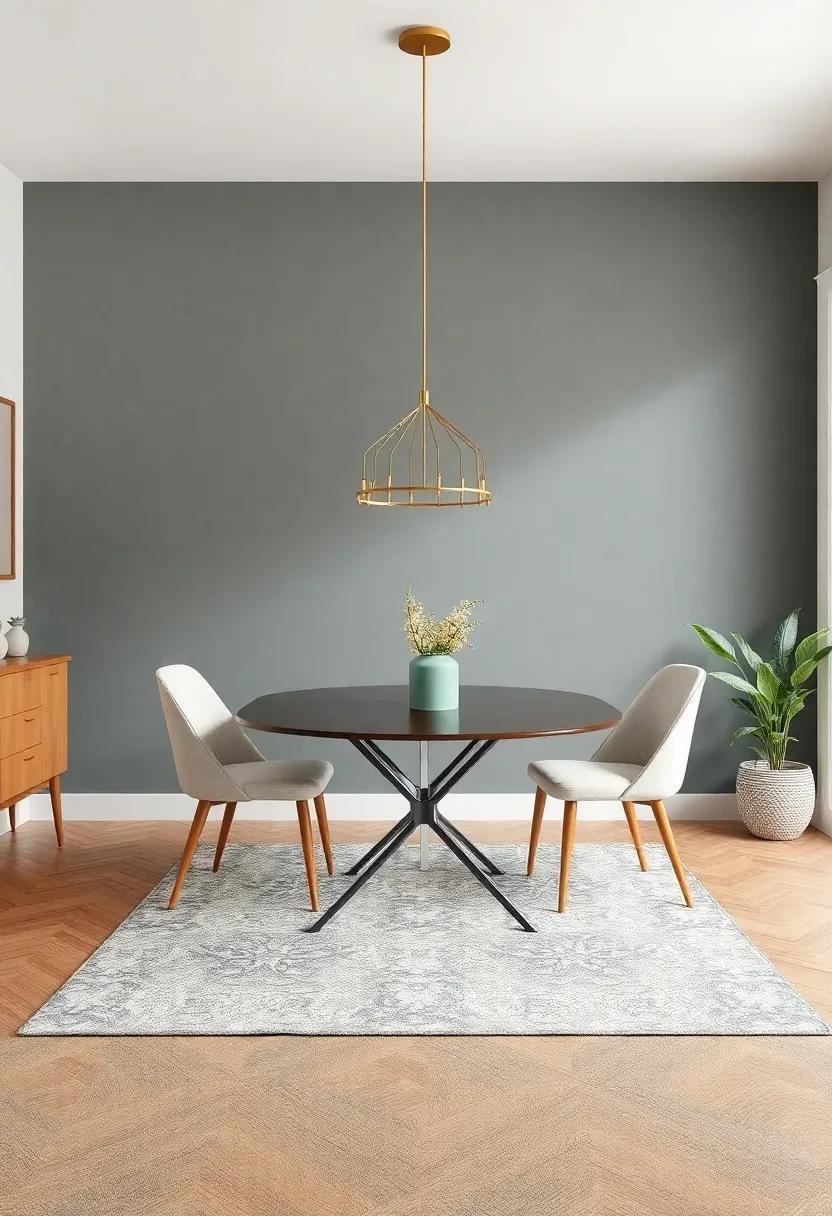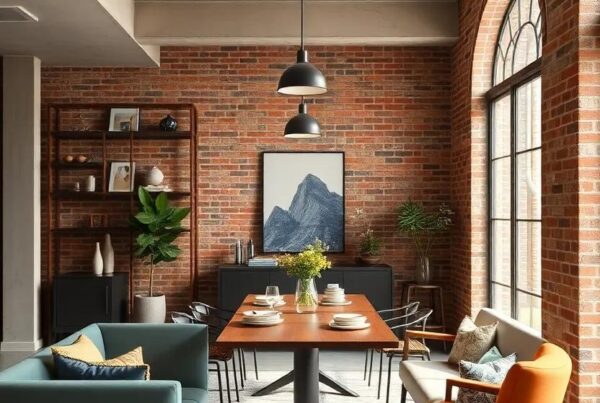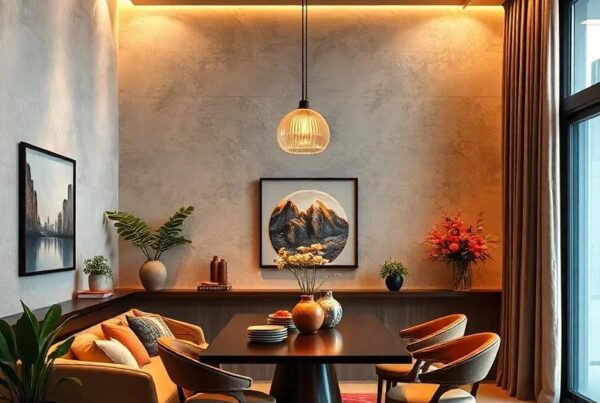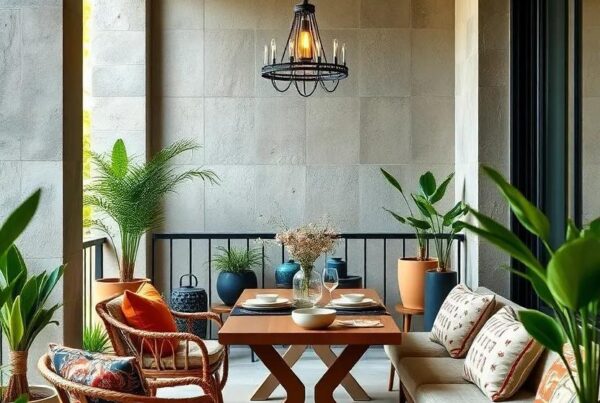In the heart of every home lies a space that brings family and friends together—a place where stories are shared over meals and laughter resonates through the walls. The dining room, frequently enough regarded as the soul of this gathering, has the potential to be both functional and gorgeous. One of the simplest yet most impactful ways to elevate this space is by introducing a patterned rug. More than just a decorative element, a carefully chosen rug can infuse personality, warmth, and style into your dining area.In this article, we delve into the enchanting world of patterned rugs, exploring how they can transform your dining room from ordinary to remarkable. Join us as we uncover the myriad benefits of thes striking textiles and offer insights into selecting the perfect design to reflect your unique taste and enhance your dining experience.
Elevating Aesthetic appeal: the Role of Patterned Rugs in Dining Room Design
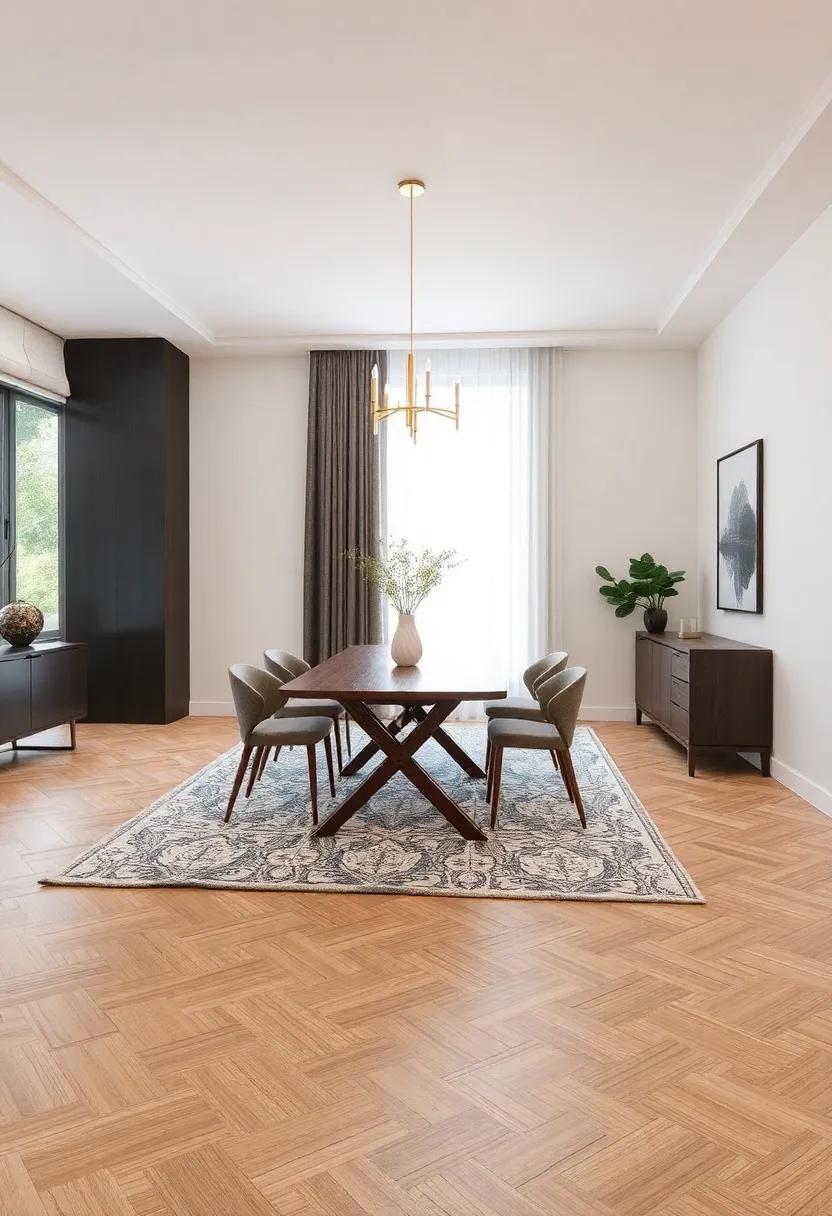
Patterned rugs serve as a captivating focal point in dining room design,effortlessly drawing the eye and enhancing the overall aesthetic. Wiht a variety of designs, colors, and textures available, they can elevate the ambiance of the space, making every meal feel like a special occasion. Whether you opt for intricate floral motifs or bold geometric shapes, these rugs can bring depth and personality to your dining area. Their tactile quality not onyl adds comfort underfoot but also contributes to a warm and inviting atmosphere that encourages conversation and connection around the table.
Incorporating patterned rugs into your dining room can also complement your existing decor; the right rug can seamlessly tie together various elements of the space. Consider the following tips when choosing a rug:
- Colour coordination: Match the rug’s colors with your dining chairs or wall art for a cohesive look.
- size Matters: Ensure the rug is large enough to encompass the dining table and chairs, allowing for easy movement.
- Material Selection: Choose rugs made from durable materials that can withstand spills and heavy foot traffic.
By thoughtfully selecting a patterned rug, you can define your dining room’s style and set the tone for gatherings, turning an ordinary dining experience into something truly enchanting.
Mixing Textures: How Patterned Rugs Complement Various Dining Room Styles
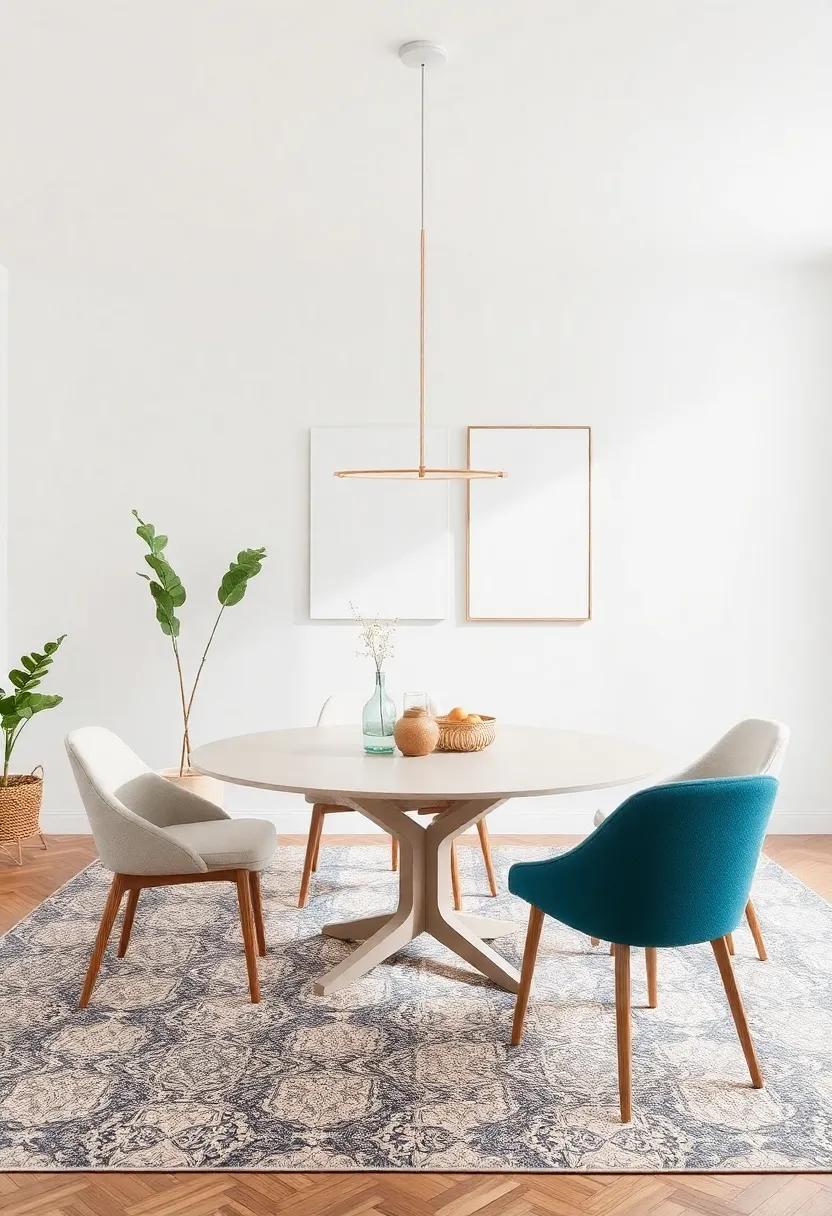
Patterned rugs serve as more than just decorative pieces; they can dramatically redefine the ambiance of dining spaces, drawing together various elements within the room. By incorporating bold geometric designs or intricate floral patterns, you can enhance contemporary settings while maintaining a touch of elegance. For example, a vibrant kilim rug can add warmth and artistry to modern minimalism, while a classic Persian design can effortlessly elevate conventional décor. Consider how these variables can synchronize with dining chairs and tabletops to create a cohesive look. The right rug can also serve as a visual anchor, grounding the space and creating a subtle division between dining and living areas.
When choosing a patterned rug for your dining room, think about the following combination strategies to maximize aesthetic impact:
- Contrast Textures: Pair a plush shag rug with sleek wooden furniture for striking contrast.
- color Harmony: Select a rug that includes colors from both your dining table and wall art to create visual unity.
- Size Matters: Ensure the rug is large enough for the dining table and chairs,allowing for easy movement.
To illustrate the relationship between pattern and style, the table below summarizes key rug types and their compatibility with various dining room aesthetics:
| Rug Type | Style Pairing |
|---|---|
| Geometric | Modern, Industrial |
| Floral | Traditional, Cottage |
| Solid Color | Minimalist, Scandinavian |
| Oriental | Eclectic, Vintage |
Color Coordination: Finding the Perfect Palette for Your Dining Room Rugs
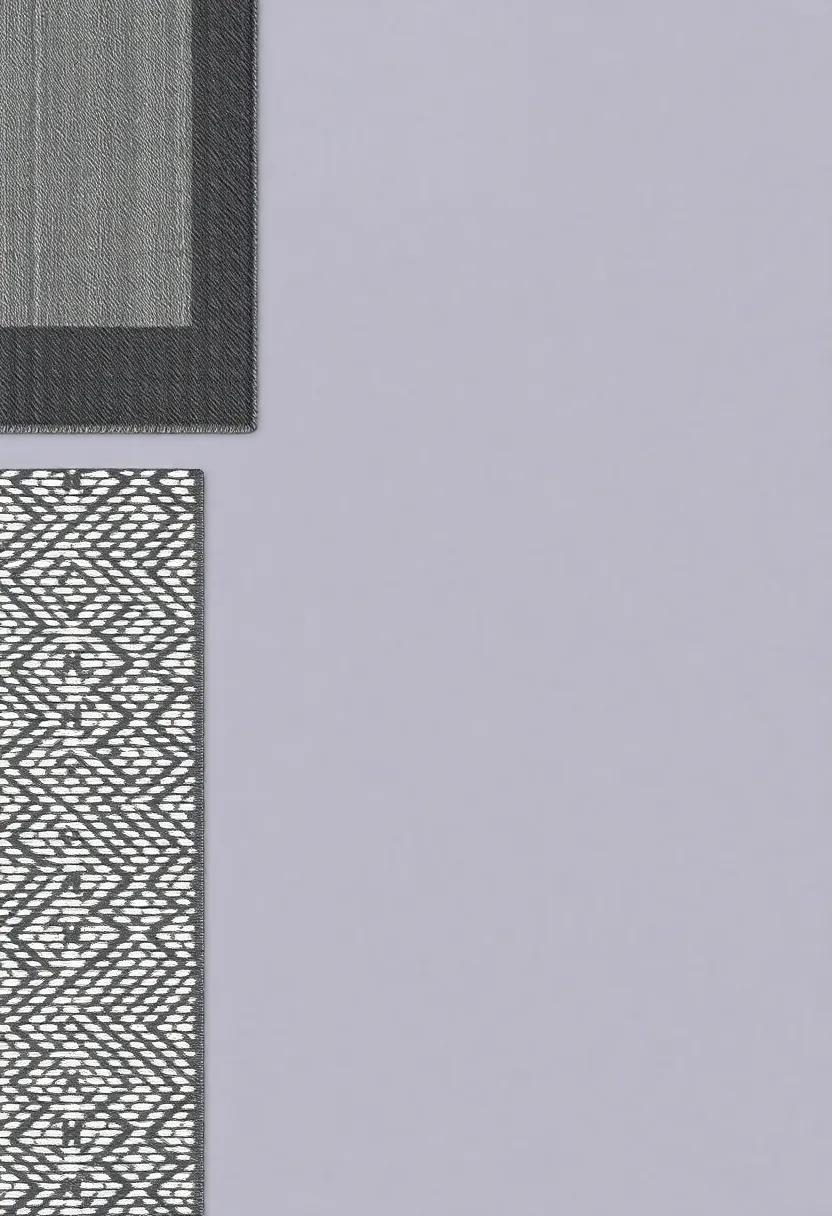
Choosing the right color palette for your dining room rugs can substantially elevate the overall aesthetic of your space. Start by considering the existing color scheme in your dining area. Take stock of your walls, furniture, and decor items. Here are some elements to contemplate when selecting your rug:
- Complementary Colors: Choose rugs with hues that complement the existing palette to create harmony.
- Accent Shades: Incorporate colors that serve as accents to breathe life into your space.
- Neutral bases: Consider rugs with neutral tones to balance bolder colors in your dining decor.
in addition to matching colors, think about the mood you want to establish in your dining area. Warm colors like reds or oranges can create an inviting atmosphere, while cooler shades like blues and greens evoke calmness. By understanding the psychological impact of colors, you can enhance the dining experience for your guests. A well-planned combination might look like this:
| Color | Effect | Best Used For |
|---|---|---|
| Warm Red | Stimulates appetite | Family dinners |
| Soft Blue | Encourages conversation | Social gatherings |
| earthy Greens | Brings nature indoors | Casual meals |
Layering Patterns: Expert Techniques for harmonious Rug Combinations
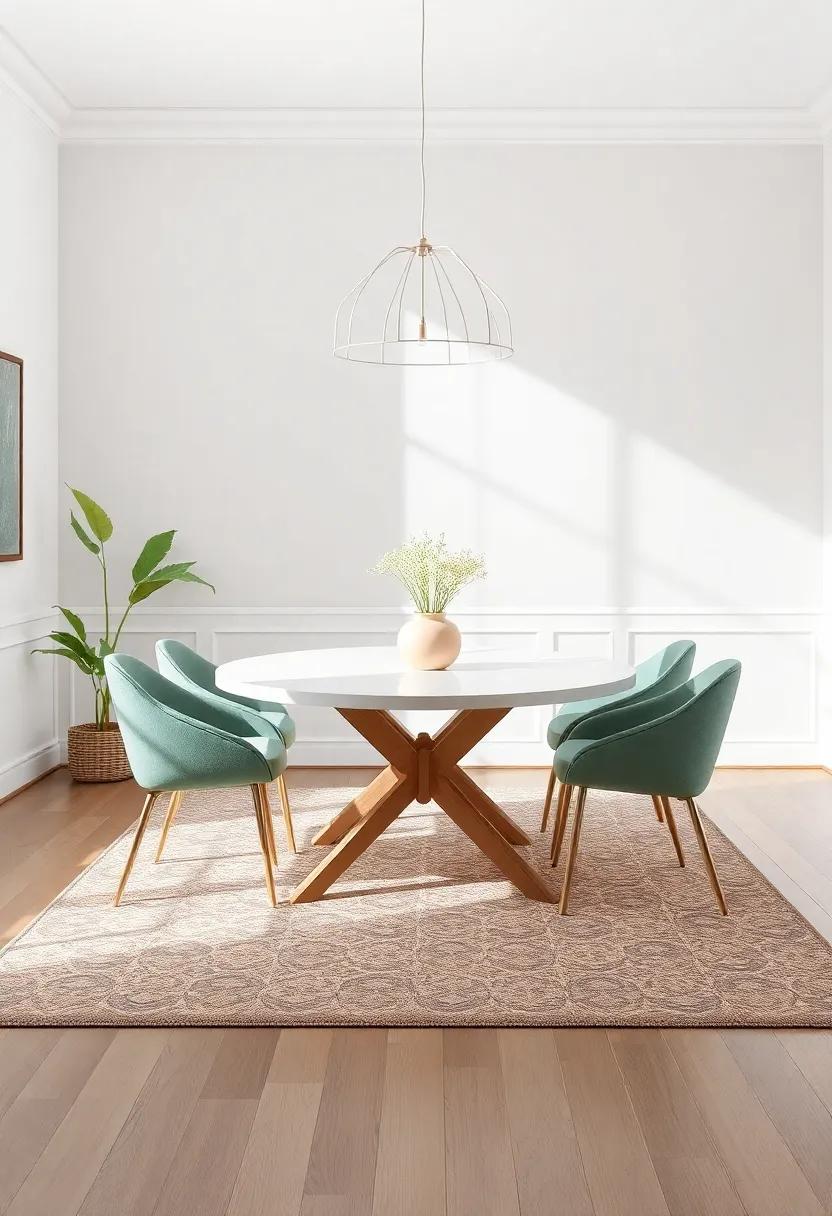
When it comes to combining rugs in your dining area, the key is to create a balanced dialog between patterns. Start by choosing a dominant rug that will anchor the space, whether it features a bold geometric design or large floral motifs. From there, select a complementary rug that offers a more subtle pattern or texture. For instance, pairing a vibrant Persian rug with a soft, neutral striped accent rug can create depth and dynamism. Consider the color palette of your dining room to ensure both rugs harmonize effectively, drawing from a shared color scheme or contrasting tones that coexist beautifully.
To elevate your layering game, keep these expert techniques in mind:
- scale Variation: Mix large patterns with smaller motifs for visual intrigue.
- Material Contrast: Incorporate different textures such as a plush wool with a flat-woven jute for added warmth.
- Border Balance: Use rugs with borders or defined edges to frame your layered look and unify the arrangement.
| Dominant Rug Type | Complementary Rug Type | Suggested Patterns |
|---|---|---|
| Geometric | Floral | Triangles & Flowers |
| Striped | textured Solid | Lines & Plain |
| Persian | Neutral Weave | Ornate & Simple |
Anchoring the Space: The Importance of Rug Size in Your Dining Room
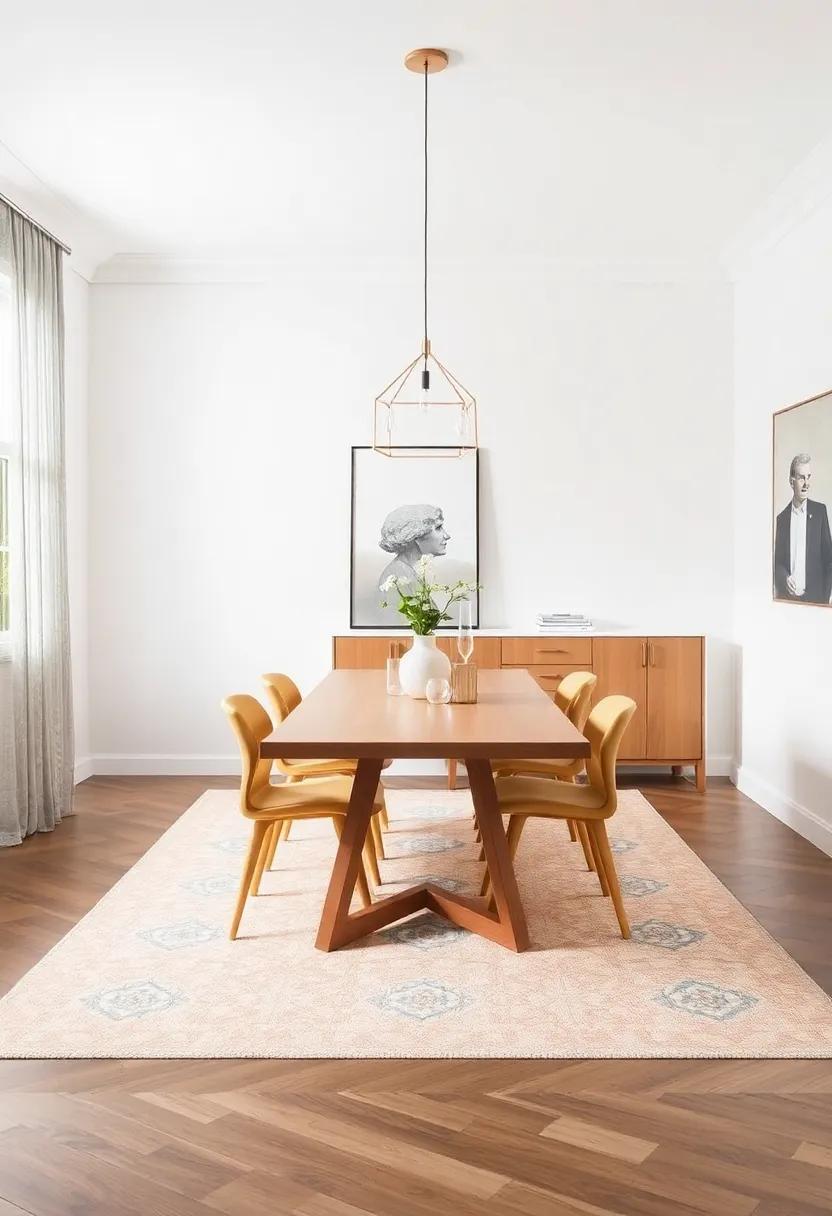
The size of your rug can dramatically influence the overall aesthetic and functionality of your dining room. A well-chosen rug serves not only as a decorative piece but also as an anchor, defining the space and providing a comfortable area underfoot. When selecting a rug,consider the following key points:
- Proportion: It’s essential that the rug complements the dimensions of your dining table. Ideally, the rug should extend at least 24 inches beyond the edges of the table.
- Balance: A large rug can create a sense of cohesion in a spacious room, while a smaller rug can offer an intimate vibe in smaller areas.
- Style matching: select a rug that harmonizes with your dining room decor, enhancing both the furniture and other design elements.
Along with creating visual boundaries, the right rug has practical benefits such as protecting your floor and dampening sound. The placement of your rug can follow some simple guidelines to maximize its impact:
| Dining Room Size | Recommended Rug Size |
|---|---|
| Small (up to 8 seats) | 5′ x 8′ |
| Medium (8 to 10 seats) | 8′ x 10′ |
| Large (10+ seats) | 9′ x 12′ |
Remember, a beautifully patterned rug can also add depth and personality, making the dining experience more inviting and enjoyable. Embrace the charm of a well-selected rug that seamlessly incorporates style, comfort, and practicality into your dining space.
Cultural Inspirations: Exploring Global Patterns for Unique dining Decor
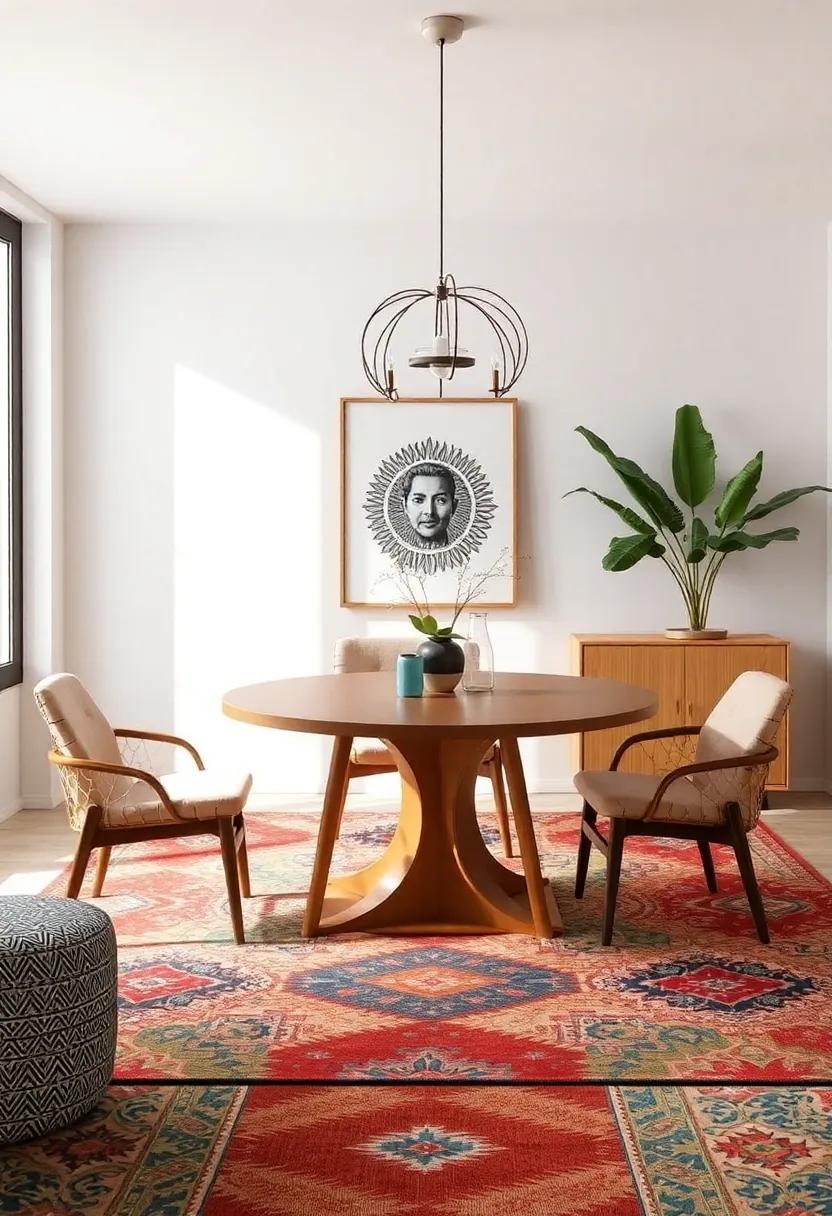
Patterns have long served as a reflection of cultural identity, showcasing the vibrant tapestry of global traditions. When considering the decor of your dining area, incorporating unique patterns inspired by diverse cultures can transform the space into a feast for the senses. Vibrant Moroccan tiles can infuse warmth with their intricate designs, while the bold Geometric forms found in Indian textiles offer a striking backdrop for casual meals or formal gatherings. Each patterned rug holds a story, a heritage that whispers traditions of its origin while enhancing the ambiance of your dining experience.
To successfully blend these cultural influences, consider the following elements:
- Color Palette: choose colors that complement your existing decor yet stand out to create focal points.
- Texture: Mix different rug materials, like flatweave or plush, to add depth.
- Size: Ensure the rug size is proportionate to your dining table to create balance.
An effective way to visualize the fusion of these patterns is by exploring a selection of popular global patterns in a simple table:
| Region | Pattern Inspiration | Key Features |
|---|---|---|
| Morocco | Azulejos | Colorful tiles with intricate mosaics. |
| India | Dhurrie | Bold geometric shapes with traditional motifs. |
| Scandinavia | Floral Prints | Minimalistic designs with natural elements. |
Seasonal Transitions: Choosing Rugs That Shift With Your Dining Room Themes
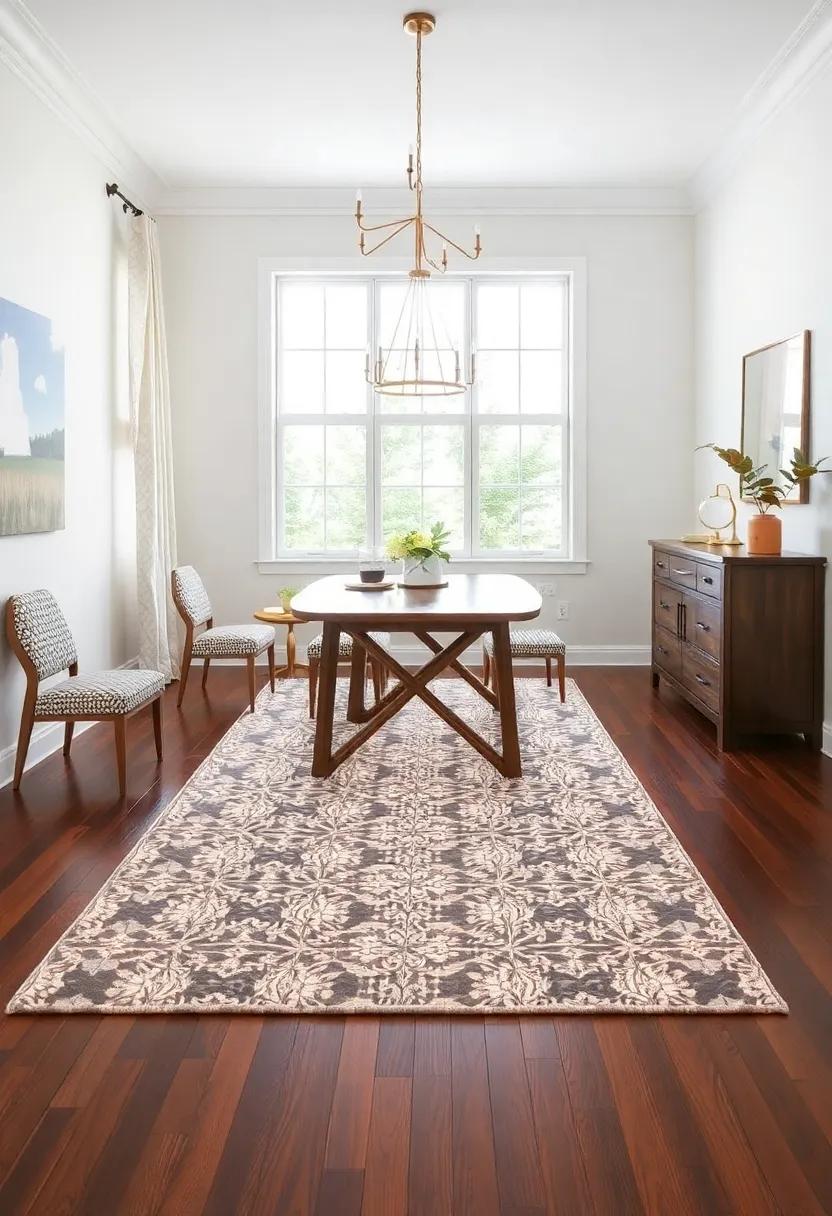
As seasons change, so do the moods and themes of our dining rooms. A striking patterned rug can serve as the artistic anchor for your space, effortlessly adapting to the evolving ambience of each season.For a fresh spring vibe, consider a light and airy rug with floral motifs to evoke a sense of renewal. As summer approaches, opt for vibrant, tropical patterns that bring warmth and liveliness to your gatherings. In contrast, the autumn months call for rich, earthy tones and cozy textures that invite comfort as you celebrate harvest feasts, while winter is perfect for intricate designs that add a touch of festive elegance.
To curate a cohesive look, focus on a few key elements when selecting a rug for each season:
- Color Palette: Choose colors that either complement or contrast your existing décor.
- Texture: Select rugs with varying textures to create depth and interest.
- Pattern Size: Incorporate larger patterns for open spaces and smaller patterns for more intimate settings.
- Material: opt for durable materials that are suitable for different seasonal activities and spills.
| Season | Suggested Rug Patterns | Key Features |
|---|---|---|
| Spring | Floral, Pastel | Lightweight, Fresh |
| Summer | Tropical, Radiant | Vibrant, Energetic |
| Autumn | Geometric, earthy | Cozy, Warm |
| Winter | Iridescent, Intricate | Elegant, Rich |
Creating Contrast: Using Patterned Rugs to highlight Structural Features

Patterned rugs do more than simply cover the floor; they serve as exquisite canvases that amplify the architectural details of your dining room. By playing with colors, shapes, and motifs, these rugs create a vivid contrast against your space’s structural features. For instance, a bold geometric pattern can draw attention to the sharp angles of a modern dining table, while an intricate floral design might soften the lines of a rustic wood setting. this thoughtful interplay enhances the room’s visual dynamics and invites guests to engage with the unique elements of your decor.
To ensure that your chosen rug complements rather than competes with your room’s existing features, consider the following aspects:
- Color Palette: Select hues that either harmonize with or contrast against wall colors and furniture.
- Scale of Pattern: Match the rug’s pattern size to the dimensions of the dining room.
- Style Consistency: Ensure that the rug style aligns with the overall design theme, whether it’s farmhouse chic or contemporary minimalism.
Additionally, you can utilize Tables to compare trend-inspired patterns that work well with various structural elements.Below is a simple breakdown:
| Style of Rug | Best Suited Structural Feature |
|---|---|
| Chevron | Angular Chairs |
| Floral | Round Table |
| geometric | Modern Art Pieces |
Underfoot Comfort: The Sensory Benefits of Soft Rugs in Dining Areas
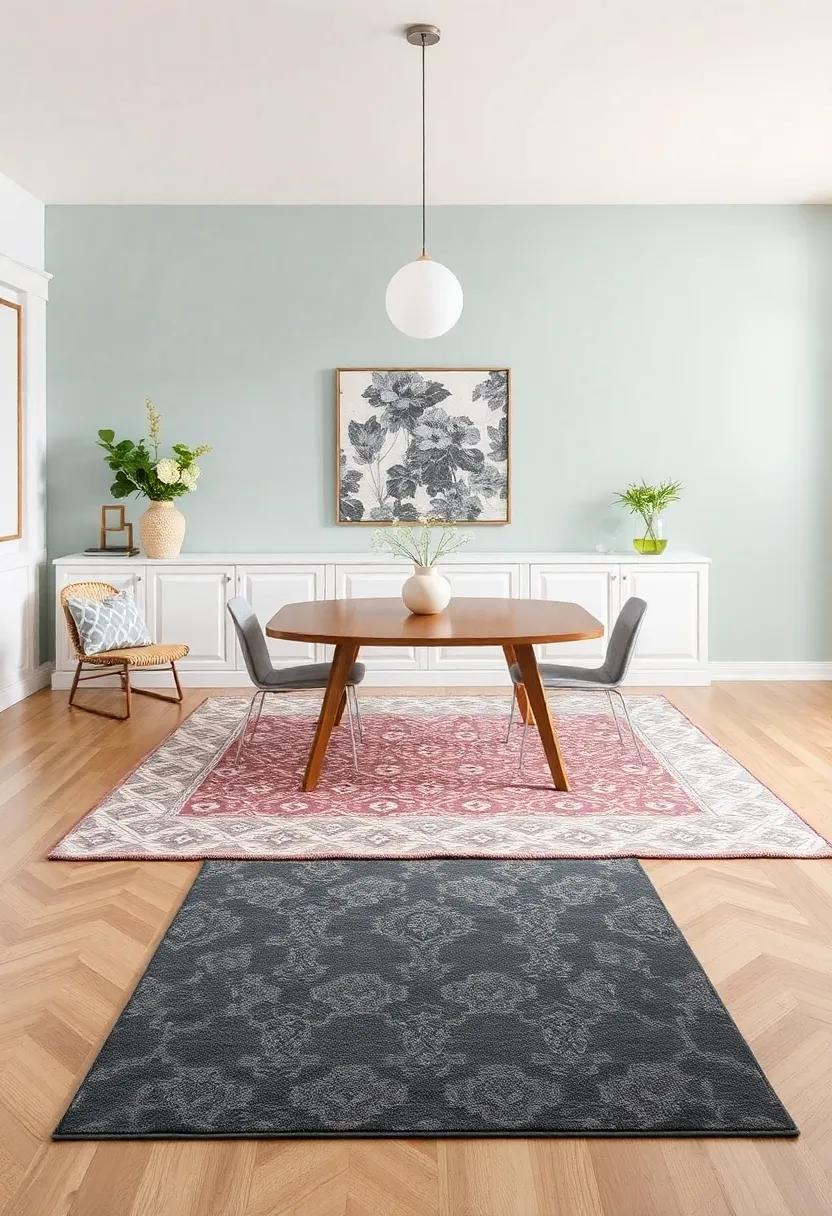
When you step into your dining area, the sensation of soft rugs underfoot can dramatically enhance your experience. The plush texture invites you to linger longer at the table, whether you’re sharing a meal with family or entertaining friends. Soft rugs provide a cozy barrier against the cold floor, creating a warm atmosphere that encourages comfortable gatherings. They absorb sound, making the ambience more inviting, and offer a tactile sensation that engages the senses directly. Imagine the feeling of thick, well-crafted fibers welcoming your bare feet, adding a layer of intimacy to every dining occasion.
Additionally, these textures play a vital role in the overall aesthetic of the space. With patterned rugs, you can inject personality and style into your dining room, creating a striking focal point that harmonizes with your decor. The visual richness of a well-chosen rug can accentuate color palettes and enhance the room’s overall ambiance. Consider the following benefits:
- Enhanced sensory experience: The softness aids in creating a calming atmosphere.
- Noise reduction: Plush rugs help minimize echoes, promoting a peaceful dining experience.
- Temperature control: They provide a barrier against cold flooring, keeping the space cozy.
- Versatile styling: A variety of patterns can easily accentuate existing decor elements.
Designing a Focal Point: Transforming Dining Rooms with Striking rugs
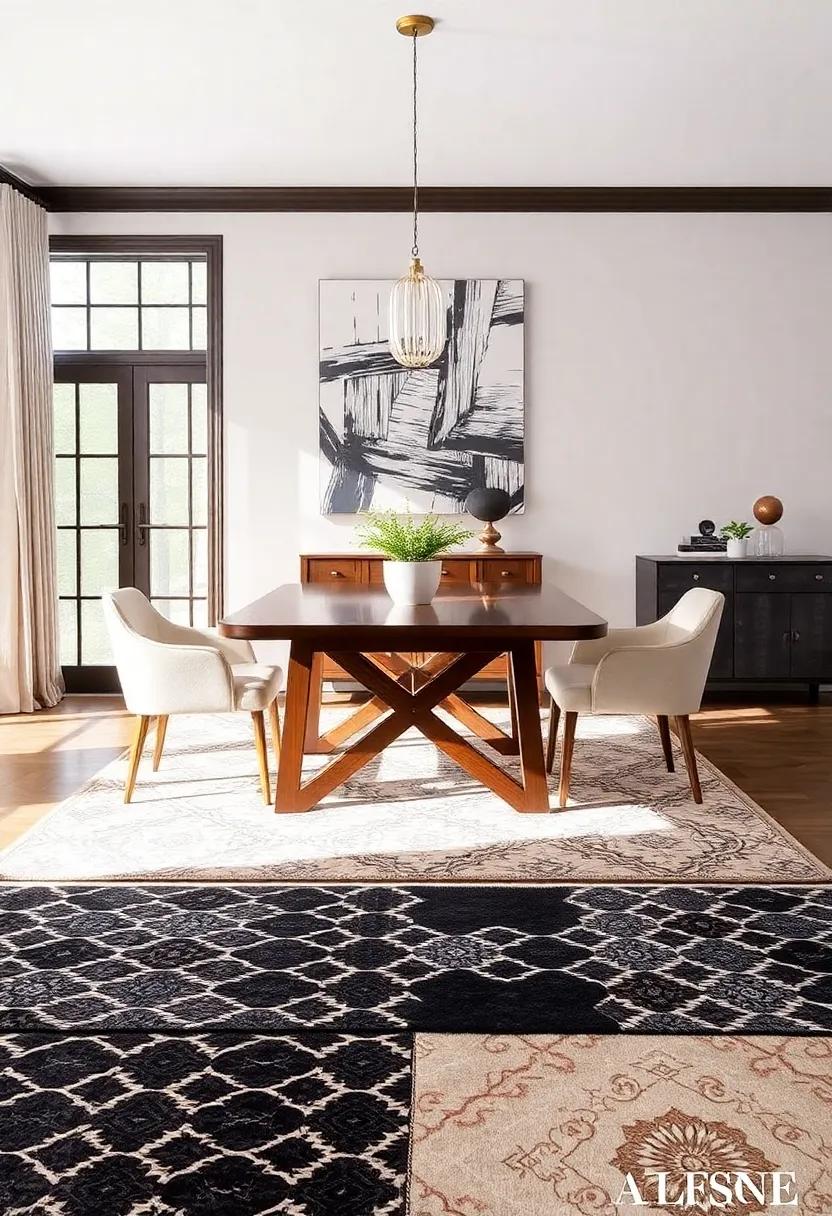
In any dining room, the right rug can serve as a stunning focal point that draws the eye and sets the tone for the entire space. A well-chosen rug not only anchors the room but also adds texture and warmth,enhancing the overall ambiance.With a plethora of patterns and colors available, it’s essential to consider aspects such as the room’s existing decor, size, and desired aesthetic when selecting a rug. Here are some elements to keep in mind:
- Size Matters: Ensure the rug is large enough to accommodate all dining chairs when pulled out, creating a cohesive look.
- Color Palette: Choose colors that complement or contrast with the wall and furniture to create visual interest.
- Pattern Play: Opt for bold patterns that can add depth or subtle designs to maintain harmony and complement existing elements.
When transforming your dining experience with a striking rug, it’s helpful to envision how it interacts with other furnishings. Assessing the dynamics of the room can guide you to the right choice. To visualize your options, consider laying a simple table to compare popular styles:
| Rug Style | Best Use | Effect on Space |
|---|---|---|
| Geometric | Modern Dining Rooms | Creates a bold, contemporary feel |
| Floral | Traditional Settings | Adds softness and warmth |
| Solid Color | Minimalist Designs | Enhances spaciousness and simplicity |
Balancing Boldness: When to Choose Subtle Patterns Over Vibrant Designs
Choosing the right patterns for your dining room can make all the difference in creating an inviting atmosphere. While vibrant designs can offer a splash of energy,subtle patterns often provide a sophistication that enhances the overall ambiance without overwhelming the senses. Subtle patterns, such as muted geometrics, understated florals, or soft stripes, create a backdrop that allows other design elements—like furniture and wall colors—to shine. They also have the added benefit of being versatile, fitting seamlessly into both modern and traditional settings.
When selecting a rug, consider how the pattern will interact with other elements in the room. Here are key aspects to keep in mind:
- Color Palette: Choose patterns that complement your existing colors.
- Texture: Subtle patterns can enhance the tactile experience without competing for attention.
- Scale: Smaller,intricate patterns can make a space feel cozier,whereas larger patterns can help to open up a room.
To help you visualize these options, refer to the table below that contrasts different types of patterns:
| Pattern Type | Effect on Space | Best Used With |
|---|---|---|
| Muted Geometrics | Creates structure without dominance | Modern decor |
| Understated Florals | Adds warmth and comfort | Rustic or traditional settings |
| Soft stripes | Enhances openness and elongates space | casual dining areas |
Dining room Themes: Matching Rugs to Your Chosen Interior Motif

When it comes to enhancing the visual appeal of your dining room, the synergy between your chosen interior motif and the rug can make all the difference. Bohemian styles, as an example, thrive on vibrant colors and eclectic patterns, so look for rugs that feature bold geometric designs or floral prints. If your design leans more toward a minimalist aesthetic, opt for muted tones and subtle textures to create a cohesive and serene ambiance. A well-chosen rug can act as a bridge, connecting the various elements of your decor while adding warmth and comfort underfoot.
For those leaning towards a modern farmhouse theme, consider choosing rugs made of natural fibers with plaid or checkered patterns, evoking a sense of rustic charm. On the other hand, a classic or traditional dining room can be complemented beautifully with Oriental rugs or Persian designs, which offer intricate details and rich colors. To help you envision the options better, refer to the table below that summarizes rug styles and interior motifs:
| Interior Motif | Suggested Rug Styles |
|---|---|
| Bohemian | Vibrant and Eclectic Patterns |
| Minimalist | Muted Tones and Subtle Textures |
| Modern farmhouse | Natural Fibers with Plaid Patterns |
| Classic/Traditional | Oriental and Persian Designs |
Sustainable Choices: Eco-Friendly Rugs That Enhance Dining Room Charm
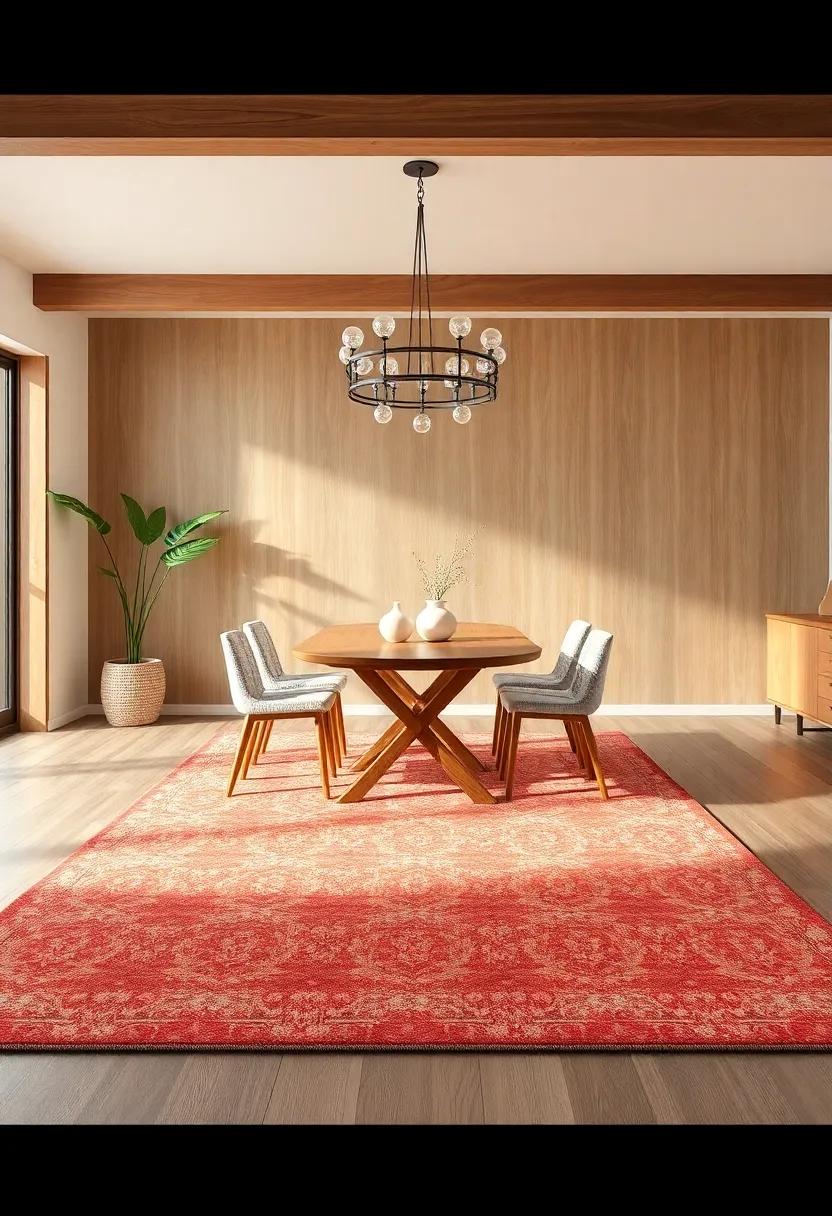
When it comes to creating a cozy and inviting dining room, the floor beneath your feet plays a crucial role. Eco-friendly rugs not only provide comfort and warmth but also add a touch of charm and sustainability to your space. Made from natural materials like cotton, jute, or wool, these rugs bring texture and style without compromising the environment. By choosing patterns that complement your dining décor,you turn an ordinary room into an extraordinary one. Consider selecting pieces that feature geometric designs, floral prints, or tribal motifs to add visual interest and reflect your personal taste.
Integrating a patterned rug into your dining area can significantly influence the overall ambiance. These rugs set a foundation that enhances the dining experience, encouraging gatherings and celebrations. When selecting your rug, look for options that are not only aesthetically pleasing but also durable and easy to maintain. Here are some compelling benefits of choosing eco-friendly rugs:
- Biodegradable materials reduce landfill waste.
- Non-toxic dyes ensure a healthier indoor environment.
- Fair trade practices support artisan communities.
- Energy-efficient production methods lower your carbon footprint.
artistic Expressions: How Rug Patterns Can Tell a story in Your Dining Space

Rug patterns offer a vivid canvas that can breathe life into your dining space, serving as a captivating narrative thread that stitches together the elements of your room. Each design tells a story, reflecting not only cultural heritage but also personal sentiments. Consider the following ways that patterns can convey meaning:
- Geometric Designs: Often symbolize balance and harmony, perfect for creating a visually engaging and serene dining atmosphere.
- Floral Patterns: Invoke feelings of nature and freshness, ideal for adding a touch of warmth and inviting charm.
- Abstract Art: Introduces modernity and creativity to the dining experience, sparking conversation among guests.
When selecting a rug, think of it as a storyteller that complements your dining environment. Here’s a quick overview of popular rug patterns and their associated emotions:
| Pattern | Emotion |
|---|---|
| Chevron | Energy and Movement |
| Damask | Elegance and Luxury |
| Patchwork | Playfulness and Warmth |
Layers of Meaning: The Symbolism Behind Popular Rug Designs
Patterned rugs are more than just decorative items; they serve as visual narratives that enrich your dining room with layers of meaning. For instance, geometric patterns often symbolize balance and harmony, making them ideal for a space meant for gathering and sharing meals. Conversely, floral designs can evoke feelings of growth and vitality, infusing your dining area with a sense of freshness and comfort. These designs not only complement your décor but also reflect the personality and lifestyle of those who inhabit the space.
When considering a patterned rug, it’s helpful to understand the cultural meaning behind various motifs. Some common symbols found in popular rug designs include:
- stripes: Representing unity and continuity.
- Diamonds: Often signify prosperity and potential.
- Abstract shapes: Invoking creativity and individuality.
The choice of a rug can indeed transform the ambiance of your dining room, serving not just as a backdrop for your meals but as a statement piece that tells a story.
Rug Placement: Strategic Arrangements to Enhance Your dining Experience

Elevating your dining experience can be as simple as rethinking your rug placement. A strategically placed patterned rug can define the dining area, creating a cozy ambiance that fosters conversation and warmth. Opt for a rug that extends at least 18 inches beyond your dining table on all sides; this ensures that chairs can slide in and out effortlessly while maintaining visual harmony. Consider using contrasting patterns to play up the room’s elements, or choose geometric shapes to instill a modern vibe. Bear in mind the color palette of your dining room; a rug that complements your color scheme can tie the entire space together, enhancing both aesthetic appeal and comfort.
When selecting the ideal rug, think about functionality as well. The material matters—natural fibers like wool or cotton are not only durable but also easy to clean in case of spills. A soft texture provides a plush underfoot comfort, inviting longer meals and delightful gatherings with friends and family. Here’s a quick overview of rug materials suitable for dining areas:
| Material | Durability | Care |
|---|---|---|
| Wool | High | Spot clean |
| Cotton | Medium | Machine washable |
| Polyester | Medium | Easy clean |
Personal Touches: Crafting Your Unique Dining Room with Custom Patterns

As you embark on the journey of designing your dining room, consider how bespoke patterns can infuse your space with individuality and warmth. Custom-patterned rugs are not merely decorative items; they serve as the perfect backdrop for cherished moments around the dining table. With options ranging from geometric prints to intricate florals, these rugs allow you to express your personality while creating a harmonious atmosphere. Here are some ways to personalize your dining area:
- Choose Colors that Reflect Your style: Opt for a color palette that complements your existing furniture and decor.
- incorporate Family Heirlooms: Use patterns that remind you of treasured items or decor passed down through generations.
- Mix and Match: Create an eclectic style by pairing different patterns in your textiles and rugs for a vibrant look.
When selecting your custom patterns, consider how they interact with the overall aesthetic of your dining space. A carefully chosen rug can ground the room while adding depth and dimension.Consider using a table showcasing various pattern inspirations:
| Pattern Type | Vibe | Best For |
|---|---|---|
| Geometric | Modern and sleek | Contemporary decor |
| floral | Warm and inviting | Classic or cottage settings |
| Abstract | Artistic and bold | Statement spaces |
By thoughtfully curating a design that resonates with your taste, your dining room can become a sanctuary of style, inviting both family and friends to gather and create lasting memories.
Interactive Spaces: Creating Inviting Dining Experiences with Thoughtful Rug Choices
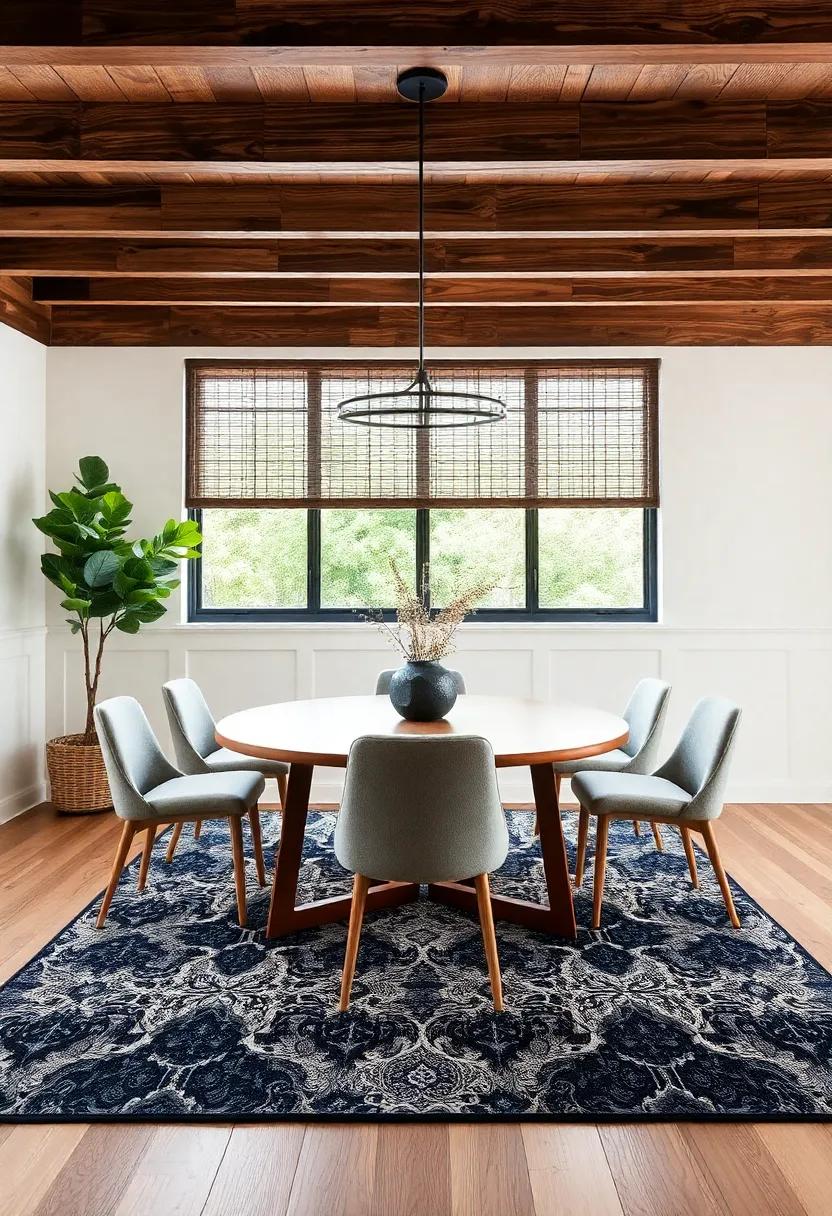
When it comes to enhancing your dining experience, the floor beneath your feet plays a pivotal role.A thoughtfully chosen rug can act as the foundation of your dining space, adding layers of warmth and a touch of personality. Consider rugs with bold patterns or subtle textures to create a visual anchor that draws people in, offering a sense of comfort and welcome. Whether you prefer intricate florals or geometric designs, the right rug can harmonize the overall decor while encouraging guests to linger longer over meals and conversations.
To make the most of your dining area, select rugs that complement your table and chairs not just in color, but also in style. Some key factors to consider include:
- Size: Ensure the rug is large enough for chairs to sit comfortably on it, even when pulled out.
- material: Choose durable and easy-to-clean fabrics suitable for potential spills.
- Pattern: Look for designs that can tie together various elements in the room, enhancing both its charm and coherence.
Take a look at the table below for a quick comparison of rug materials and their features:
| Material | Durability | Maintenance |
|---|---|---|
| Wool | Highly durable | Vacuum regularly; occasional professional cleaning |
| Polyester | Moderately durable | Stain-resistant; easy to clean |
| Cotton | Less durable | Washable; prone to staining |
insights and Conclusions
a patterned rug is more than just a decorative element; it’s a transformative piece that can breathe new life into your dining room. By carefully selecting the right design, color, and texture, you have the power to create an inviting atmosphere that reflects your personal style while enhancing the overall ambiance of the space. Whether you lean toward bold geometrics, vintage florals, or subtle textures, the charm of a well-chosen rug can unify your dining area and elevate your dining experience.As you embark on this journey of transformation, remember that it’s the little details, like a beautifully patterned rug, that can turn an ordinary meal into an extraordinary occasion. So,take the plunge,embrace the patterns,and let your dining room become a canvas of creativity and comfort. Happy decorating!
As an Amazon Associate I earn from qualifying purchases.
